Topic hubs and topic clusters have been around at the intersect of SEO and content marketing for a long time. However, with the increasing information overload and PR noise, topic hubs have once more become important in the scheme of things, especially for brand differentiation and establishing authority.
We invited Dan Shure, owner of Massachusetts-based agency Evolving SEO and host of the Experts on the Wire SEO podcast, to shed some light on the purpose, nature, and effectiveness of topic hubs. We also got some useful tips and tricks from other #SEMrushchat participants. Here are the more interesting and advanced tidbits from the chat.
Q1. What is a topic hub, and why would you create one versus a single piece of content?
A topic hub is a single, in-depth resource page on your website that is built (and updated) to satisfy searcher intent around a specific topic. This page is then buttressed by a collection of pages that address sub-topics related to it and link back to the topic hub.
There are a bunch of reasons why you should build topic hubs:
There are some topics that you could never address fully with a single page of web content, or they would become too broad and rambling.
Creating too many pages around a topic with similar weight on your site might lead to keyword cannibalization, and they might compete with each other to rank on the SERPs.
An in-depth piece of content with a lot of incoming links and mentions will cement your authority on the topic and build thought leadership for your brand.
A topic hub will provide a great user experience to someone seeking information on the subject and keep them on your site until they have met their objective. It also increases the probability of them coming back for more information.
With a good internal linking strategy, you can gradually increase the authority of your hub page for competitive keywords and move up the rankings for not just the primary keyword, but a whole lot of semantically related terms.
Dan advises building a topic hub when you want to target a topic that is so broad you could never rank for it with one page. It is better to create a page for each subtopic that you can cover and then optimize the whole set to rank for keywords on that topic.
A1.2 I am intead reffering to when you have a topic/keyword that is REALLY large in volume and/or topical depth. Like "hearing aids" and you could NEVER rank with one page, or say everything you need to say about it on one page. #semrushchat
— Dan Shure (@dan_shure) September 19, 2018
How should we think of topic hubs in terms of web content?
A1: If you have loads of content about a topic then making it a 'topic hub' is the easiest way to provide this to the user w/o having a super-sized article that is epically long.
Also, there may be links to other topics that are relevant but not directly related. #SEMrushchat
— Adam Reaney (@100percentapr) September 19, 2018
A1: A topic hub is a collection of content that shares a similar theme or category, and creating one can better group said content rather than single long pieces of content. #semrushchat
— Marccx Media (@marccxmedia) September 19, 2018
A1) A Topic Hub is a collection of content related through a specific theme (or even category). Site structure and internal linking help define the hub in terms of site architecture #semrushchat
— David Rosam (@davidrosam) September 19, 2018
What type of web pages do topic hubs constitute?
A1: IMO a Topic Hub is a resource VS a page or blog post. I was just thinking about this subject in the shower this morning actually, about what topical resource I should add to our client sites. Just need to find top queries and build from there. #semrushchat
— SEO Consultant (@JLFaverio) September 19, 2018
A1 a topic hub can be a page type that historically is known to point to many authority pages (HITs algorithm) a Semantic Topic hub is one that uses semantically related co-occuring meaningful phrases on it: https://t.co/OZlDp2DADc #SEMRUSHChat
— Bill Slawski ⚓ (@bill_slawski) September 19, 2018
a1. Topic hubs are stateless navigation pages that link semantically related content together into a produced view that presents access to all site information in a single location. They are MUY BUENO for content strategy and authority. #semrushchat
— Marianne Sweeny (@msweeny) September 19, 2018
A1: A vessel or site has a code of conduct, its how you define your data sets, present multiple inputs/outputs, function for users, tags, types, categories, will allow data to present accordingly thus more relevancy #TopicHubs #SEO @dan_shure @semrush #SEMrushchat https://t.co/SgSXervBrv
— Alexis Huddart (@Flexoid) September 19, 2018
How do we go about creating and implementing topic hubs?
A1. I'm in this ballpark. For me, it's when you have a topic like "hearing aid"; lots of content in that area; but don't want all those pages competing/canniablising for the 'big head terms' - so you hook them up to a 'hub' or topic page and rank that. #semrushchat
— Ⓞⓟⓣⓘⓜⓘⓢⓔⓨ (@Optimisey) September 19, 2018
A1: Our quarterly campaigns are individual topics that speak to the solution our product provides. We typically build content around each topic from a seasonal approach within our industry: survey, report, webinar, blog posts, PR. #semrushchat #semrushchat
— Mike Bryant (@MichaelRo22ss) September 19, 2018
Benefits of creating topic hubs:
A1: Topic hubs are collections of content pieces around a pillar. This means you have more opportunity to branch out around a topic while staying true to the overall topic messaging. It can also help establish your brand as a thought leader of sorts on that topic. #semrushchat
— CallRail (@CallRail) September 19, 2018
A1: Topic hubs allow you to create a stream of authority with which you can use to push power to these pages - I have so many case studies on this! #semrushchat
— Andy Drinkwater (@iqseo) September 19, 2018
A1/2: Keep topic hubs and solios carefully managed and the benefits are huge - you can also use internal links to help push signals to Google for your Sitelinks #semrushchat
— Andy Drinkwater (@iqseo) September 19, 2018
Topic hubs have parallels in science and biology:
A1: so, with my background in evolutionary biology, i've always visualized topic hubs as the "tree of life" - where topics are limbs & topics are branches. #SEMrushchat pic.twitter.com/rauETwDAwG
— JP Sherman (@jpsherman) September 19, 2018
A1: there's a discipline in science called "cladistics" which is a grouping and organization of organisms by shared characteristics - topic hub organization is not so different & there's always overlaps #SEMrushchat
— JP Sherman (@jpsherman) September 19, 2018
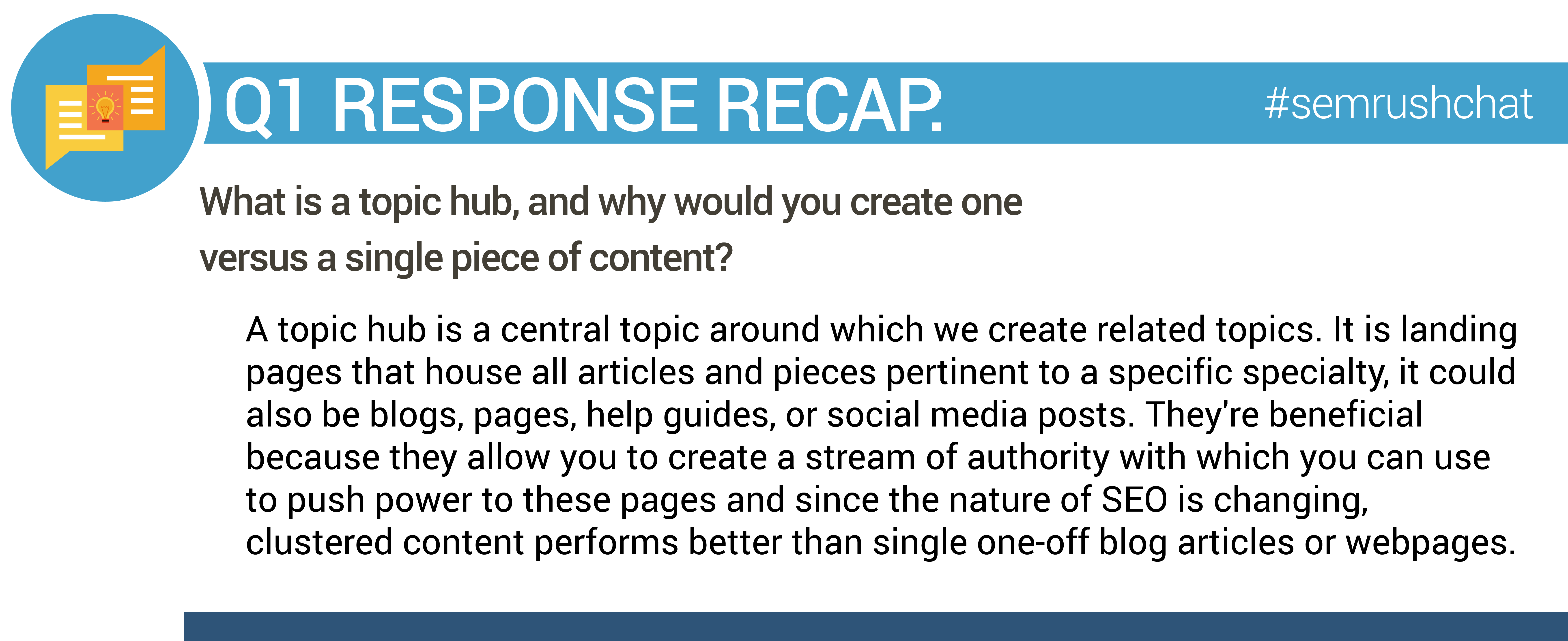
Q2. Is it true Google ranks topics over keywords now? Why or why not?
The concept of topic hubs became more important with the coming of Hummingbird when Google started using entities and topics to determine relevant search results, as opposed to just keywords. After RankBrain, those signals became stronger.
However, we shouldn’t confuse keywords with topics. A keyword is nothing more than a part of the search query. Topics are the narrative that you build around the keyword with your content. You need to take into account searcher intent and make use of appropriate semantics in your content for Google to match your topic hub to your target keywords.
SEMrush’s Topic Research is the ideal tool to help you do that. It quickly scours the web for articles and conversations related to your primary keyword, sorts them out by subtopic, and presents them in the form of index cards or mind maps (take your pick), so you can prioritize the areas to focus on according to your expertise, data, and resources available to you.
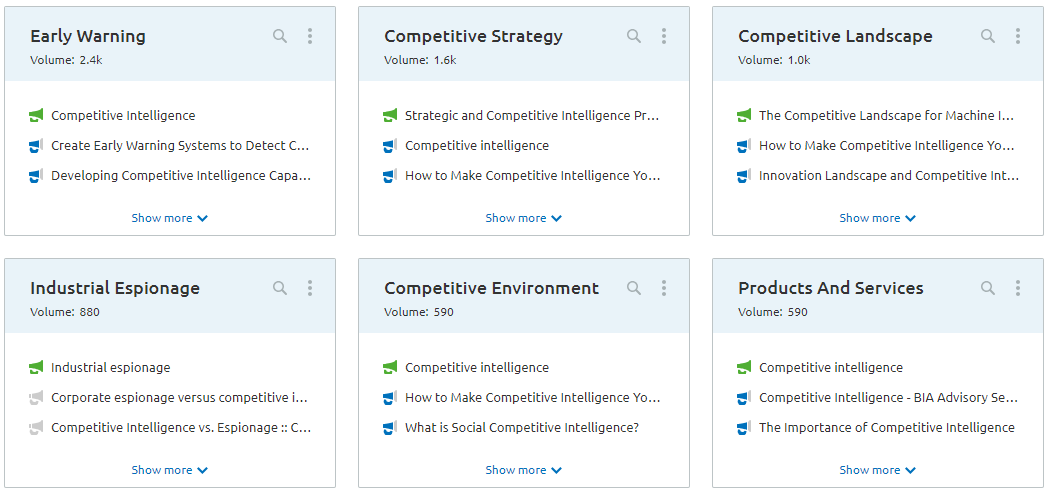
Dan doesn’t believe that “topics are the new keywords!” He emphasizes that search engines rank documents that provide the best answer to the user’s query; to do that they must first understand the keyword, then the topic, followed by the intent.
A2.2 - Search engines rank DOCUMENTS that answer you user's query. Sure there may be some better understanding of query patterns etc but the basic principles of keyword->topic->intent have not dramatically changed. #SEMrushchat
— Dan Shure (@dan_shure) September 19, 2018
A2.3 - In general, I would ALWAYS focus on every keyword/topic you want to rank for as a clean slate situation, and design your pages/URLs/page-types/internal linking etc completely specific to each situation. There is NO prescriptive approach in SEO :) #SEMrushchat
— Dan Shure (@dan_shure) September 19, 2018
Keywords and topics are not the same:
A2: Not at all - both can be ranked equally. You can rank a single keyword or a topic but I can imagine that there are niche's where one might be easier than the other #semrushchat
— Andy Drinkwater (@iqseo) September 19, 2018
A2) It's not one or the other IMHO. Google hasn't swapped keywords for topics. It has made strides towards understanding content, and in doing so, embraces both keywords and topics.
Then there's searcher intent, of course. #semrushchat
— David Rosam (@davidrosam) September 19, 2018
Google understands topics and categories better, and this fact might lead us to think that they are prioritizing them over keywords:
A2 At least one patent from Google, Training set construction for taxonomic classification describes using a hierarchical classification approach to pages on a site: https://t.co/Kwx8k7KMWU #SEMRushChat
— Bill Slawski ⚓ (@bill_slawski) September 19, 2018
A2: True or False, it doesn't matter. We all know it's secret magic sauce juice that makes the Googles like a website. Seriously though, the topic shift is upon us. #semrushchat
— Mike Bryant (@MichaelRo22ss) September 19, 2018
Marketers should understand how target keywords relate to topics and then build content that ranks for those keywords:
A2: I haven't seen any proof of Google ranking topics over keywords, but the benefits of having a #topic filled with quality content and resources for users VS a #keyword dominating page is clear. #semrushchat
— SEO Consultant (@JLFaverio) September 19, 2018
A2. I'm not going to say yes or not, but as an SEO I've seen better results by working on becoming an expert on a topic to rank high for target keywords instead of building content around a single keyword. I guess it goes back to working on EAT. #SEMrushchat
— Blas Giffuni (@BGiffuni) September 19, 2018
a2. Trick question. :) Google sorts by topic and ranks by user engagement signals. Keywords can be topics, their effectiveness for ranking relies on semantic connection with user query and behavior towards the results set. #semrushchat
— Marianne Sweeny (@msweeny) September 19, 2018
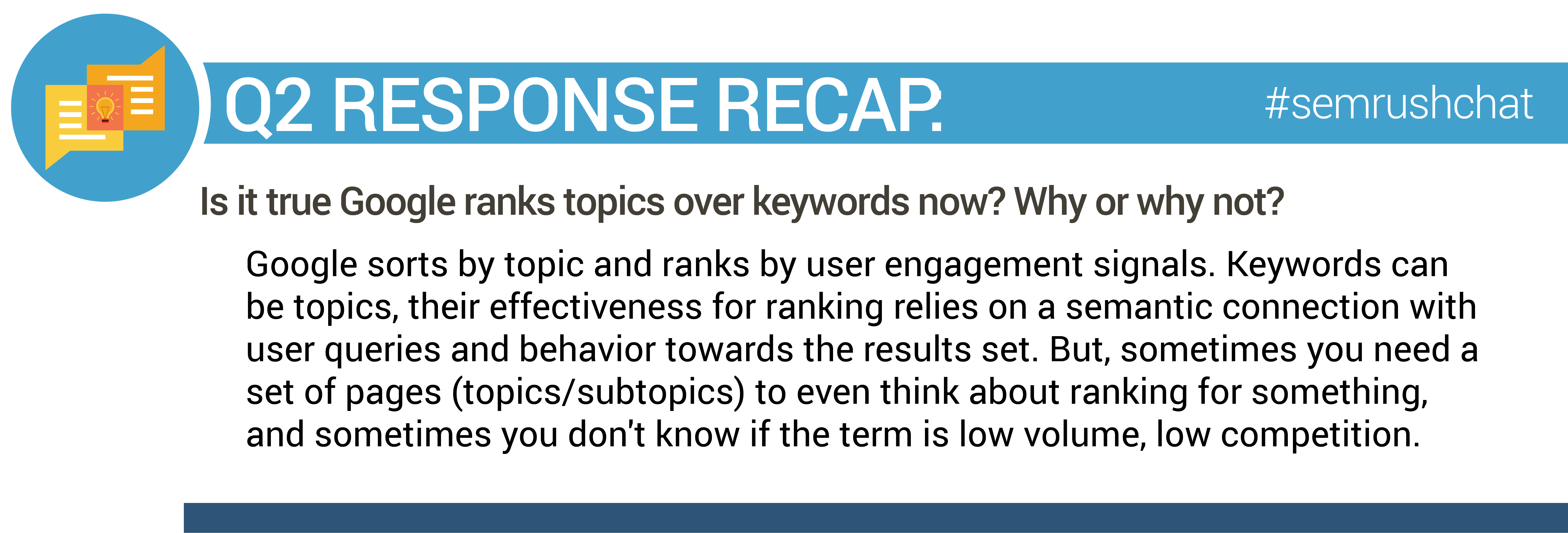
Q3. How do you do keyword research for topic hubs?
Traditionally, SEOs have done keyword research with the aim of optimizing content on one page or with the objective of ranking for different variations of the same term. Topic hubs change the game by enabling optimization for intent – they cater to an entire theme by guiding users along the purchase journey, with content covering every relevant subtopic in the appropriate formats.
You can use the SEMrush’s Keyword Magic tool to list out a wide range of keywords related to your theme and then prioritize them according to their relevance to your products or services, and potential traffic that you could get by creating content around those terms.
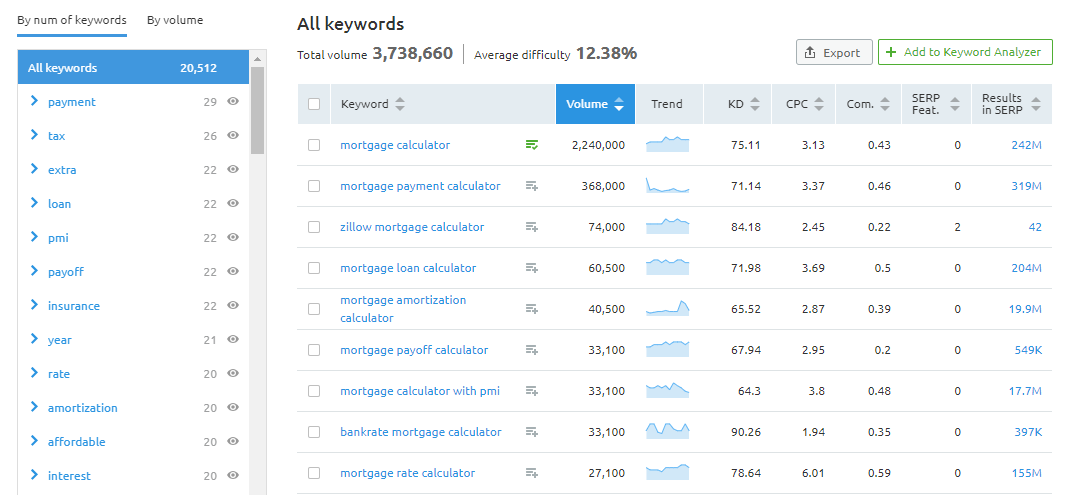
While every page would still target one or two primary keywords, the keyword research process itself needs to address entities central to your product or service, customer objectives, the various types of data available to you, and meaningful semantic terms used frequently in your niche. Therefore, you will need to match keywords to topics and subtopics (which would automatically correspond to pages or URLs.)
Dan begins by identifying a not-so-competitive seed topic that is relevant to the business, domain, and brand. He then uses a bunch of keyword tools to create a list of long tail keywords, after which he goes on to categorize and order them by relevance, competition, traffic potential, and other parameters. Finally, he decides on the set of pages he will create and prioritizes them by SEMrush traffic estimates of similar content.
A3.4 - the goal here is to take you big giant list and condense it down into what eneds up being your set of pages. I prioritize pages by using SEMrush's traffic estimates of other similar content currently ranking #SEMrushchat
— Dan Shure (@dan_shure) September 19, 2018
It is a good idea to start rummaging in your own site and internal business data for keywords…
A3 Look at your sites IA and what content it contains - your topics should be fairly obvious from that. Or when building a new site look at the proposed content and build commonality between the content subjects.
Research those topics! #semrushchat
— Simon Cox (@simoncox) September 19, 2018
A3: Look at keywords, phrases, like you would for your main business area or keyword clusters/branches vs kpi's like, footfall, conversion. ect start with your internal business data, then look at https://t.co/DTjegLRJzC #TopicHubs #SEO @dan_shure @semrush #SEMrushchat https://t.co/YICDqv66HH
— Alexis Huddart (@Flexoid) September 19, 2018
Not to mention your audience and competitors…
A3: Search intent of my target audiences, topic hubs are ideal if there are various products/ services on offer. #SEMrushchat
— Sarah Marks (@_ofwanderings) September 19, 2018
A3: the other thing about topic hub & keyword research is competitive analysis - it's good to see how others have built their hubs (if they have) so you can identify any gaps or overly templated hubs. #SEMrushchat
— JP Sherman (@jpsherman) September 19, 2018
Then go over the Google SERPs with a magnifying glass.
A3 I then take the keywords I have mapped to specific pages, look them up in Google, find the top ranking pages with the same meaning, & look for co-occurring meaningful phrases on those that seem to predict the main keyword (making it semantically meaningful, too.) #SEMRUSHchat
— Bill Slawski ⚓ (@bill_slawski) September 19, 2018
A3: All the normal KW research still applies, but an extra thing I like to do is actually Google the topic. Are there rich snippets? Related Questions? What's displaying in the SERPs.. focused pages or broad topic pages? #semrushchat
— Danny Conlon (@MissDannySEO) September 19, 2018
SEMrush by far has the most popular set of keyword research tools!
A3. We use @SEMRush as our #seo and keyword tool to make sure we're creating valuable information for our clients and industry stakeholders. Saves us time and delivers consistent results. #SEMRushChat
— pair Networks (@pairnetworks) September 19, 2018
Love the Topic Research tool. It's now my first choice when I need content ideas. #SEMrushchat
— Netvantage Marketing (@netvantage) September 19, 2018
A3. Credit where it's due, @semrush's 'Keyword Magic' tool is great for this, especially at the ideas gathering stage.
I've only dabbled with it, but the new 'Topic Research' tool looks pretty neat too.
1/2 #semrushchat
— Ⓞⓟⓣⓘⓜⓘⓢⓔⓨ (@Optimisey) September 19, 2018
A3) @semrush's Topic Research mcguffin and @answerthepublic are the tools. But before - and throughout - the process I need to start to understand searcher intent. #semrushchat
— David Rosam (@davidrosam) September 19, 2018
A3. Once you identify the topic hub, you can get more and more granular as you go. I love the "related keywords" report offered in @SEMRush. Sometimes there are terms in there that I never would have considered. #SEMRushchat
— Matt Shanley (@MattShanley) September 19, 2018
A3: First of all, log into @semrush :D
I like to find variants of the primary topic and take it from there. That might mean a narrow range of 4-6 key phrases are used when creating authority to these silo structures #semrushchat
— Andy Drinkwater (@iqseo) September 19, 2018
A3: For nationwide kw research data I use @semrush. For semi-local data I use their new CPC Map and for local data I browse within the relevant cities. #semrushchat pic.twitter.com/duyVWyJugY
— SEO Consultant (@JLFaverio) September 19, 2018
Alright, there are a few other keyword tools, albeit best used in conjunction with SEMrush!
A3: #SEMrushchat The Keyword Planner from @GoogleAds is quite nice, but from our past experience, @semrush has some great tools as well :) Those things combined with a good ole' #boolean organic google search marathon make for a strong topic hub strategy.
— NOVELDO (@noveldo_com) September 19, 2018
A3: It's helpful to use @BuzzSumo to see which topics are currently popular in your industry. However, you can also just ASK your audience what they're struggling with and what they want to see.
From there, do your keyword research. #semrushchat
— Express Writers (@ExpWriters) September 19, 2018
A3: We are big fans of @semrush's topic research tool for creating topic hubs. @answerthepublic is also beneficial. Browsing queries in Search Console helps you learn more about what your audience is looking for as well. #SEMrushchat
— Netvantage Marketing (@netvantage) September 19, 2018
A3: K.I.S.S. - Pick a top level topic, look at Google's suggested keywords, featured snippet results for those keywords (Esp. the first 5 questions in PAA boxes) and sometimes Answer The People #semrushchat
— Carrie Hill ?️? (@CarrieHill) September 19, 2018
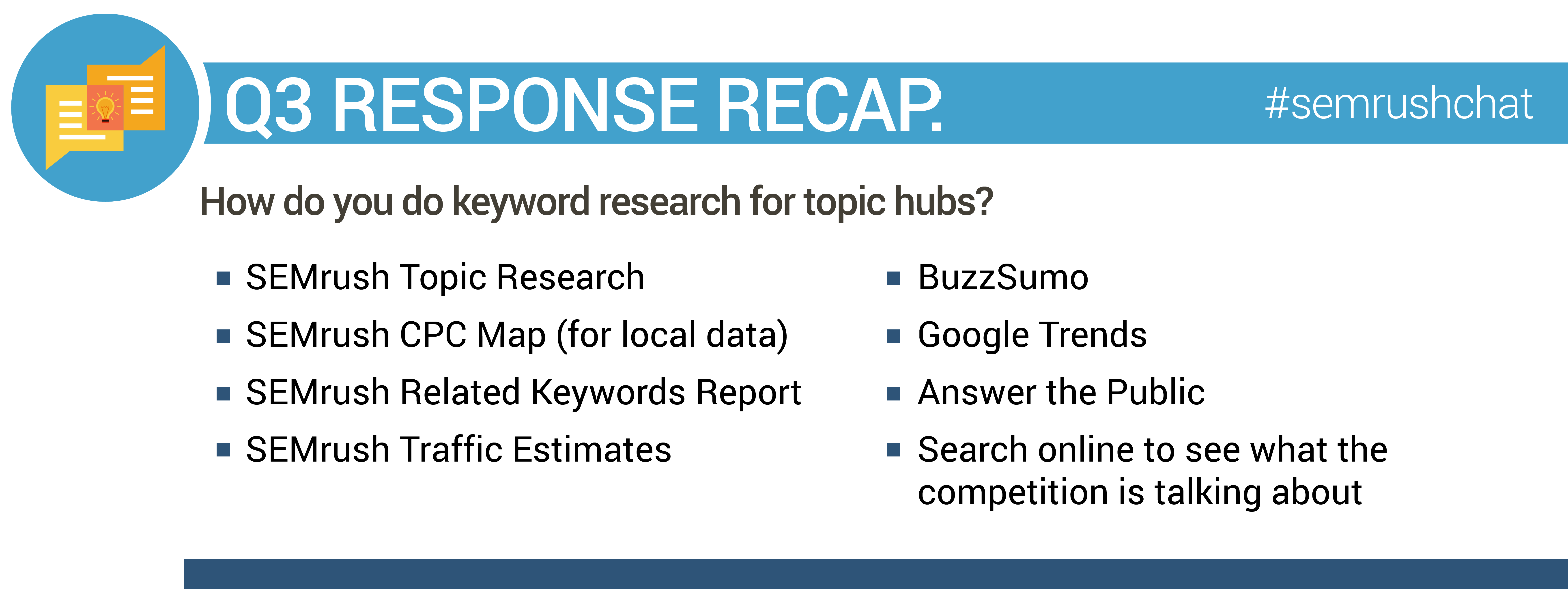
Q4. How do you determine what pages should be included in topic hubs?
The best way to go about this is to start with the data and content you already have on hand. If need be, you can change the structure and information architecture of your website to reorganize it by themes and page clusters around specific topics.
A content audit will help you revisit why you created each piece, how exactly it helps convert customers, and which topic or theme it could fit into. Then determine whether you could turn it into a hub page (by adding in-depth content) or whether it could be a nice addition to a cluster. And if you are not sure about either, don’t hesitate to kill it altogether.
SEMrush’s Content Analyzer can help you assess the relevance of your pages to the topic in question. Further by measuring the performance of these pages for a set of keywords, you can determine whether to use them as hubs or spokes and what sort of content to build around them or update them with. You can also identify where exactly you stand vis-à-vis your competitors in terms of organic visibility.

Once Dan has a list of potential pages (ordered by estimated traffic) to create, he takes it back to the client for business relevance. Then he does a quick competitive analysis and aligns keywords to pages using his own list of pre-defined parameters.
A4 - At this point I have a list of potential pages, ranked by traffic potential - then I usually take this to the client and refine the list by: business/audinece relevance, effort needed, a further competition check... #SEMrushchat
— Dan Shure (@dan_shure) September 19, 2018
A4.4 - I should just show this as an example. 1) is a screenshot of the raw list of keywords from keyword keg. 2) is the final-ish result of keywords aligned to pages #semrushchat pic.twitter.com/yteiyWujap
— Dan Shure (@dan_shure) September 19, 2018
Audit your existing content and find themes within it.
Group it by the purpose it serves on the user journey.
A4: Perform an audit of your content. What's the general keyword/topic idea? What stage of the user journey does it serve? What other content should it be connected to in order to best serve the user and his/her place in the journey? #SEMrushchat
— Carolyn Lyden (@Carolyn_Lyden) September 19, 2018
A4: Look for themes within the content. If you were creating a topic hub around bathroom sinks, you wouldn't want pages associated to that which were about laminate flooring (extreme example) #semrushchat
— Andy Drinkwater (@iqseo) September 19, 2018
A4 One way to determine which pages should go together is to write them out on index cards, and ask people to sort them for you. Rinse and repeat as necessary. #SEMRushchat
— Bill Slawski ⚓ (@bill_slawski) September 19, 2018
Find Questions to Answer
There are a lot of platforms and sources where you can find questions to answer, including forums, other sites, industry media, competitors, and customers.
A4: do you have a piece of content that answers questions from - community hubs - onsite search - quora - industry publications - google autosuggest ... #semrushchat https://t.co/NslQ8UfZUA
— JP Sherman (@jpsherman) September 19, 2018
A4.1) But generally: a) Assess what missing from the site - have you answered all the big questions from customers? b) Which areas have got lots of potential - larger search volumes c) Can you get one over on your competitors by filling a particular need? #semrushchat
— David Rosam (@davidrosam) September 19, 2018
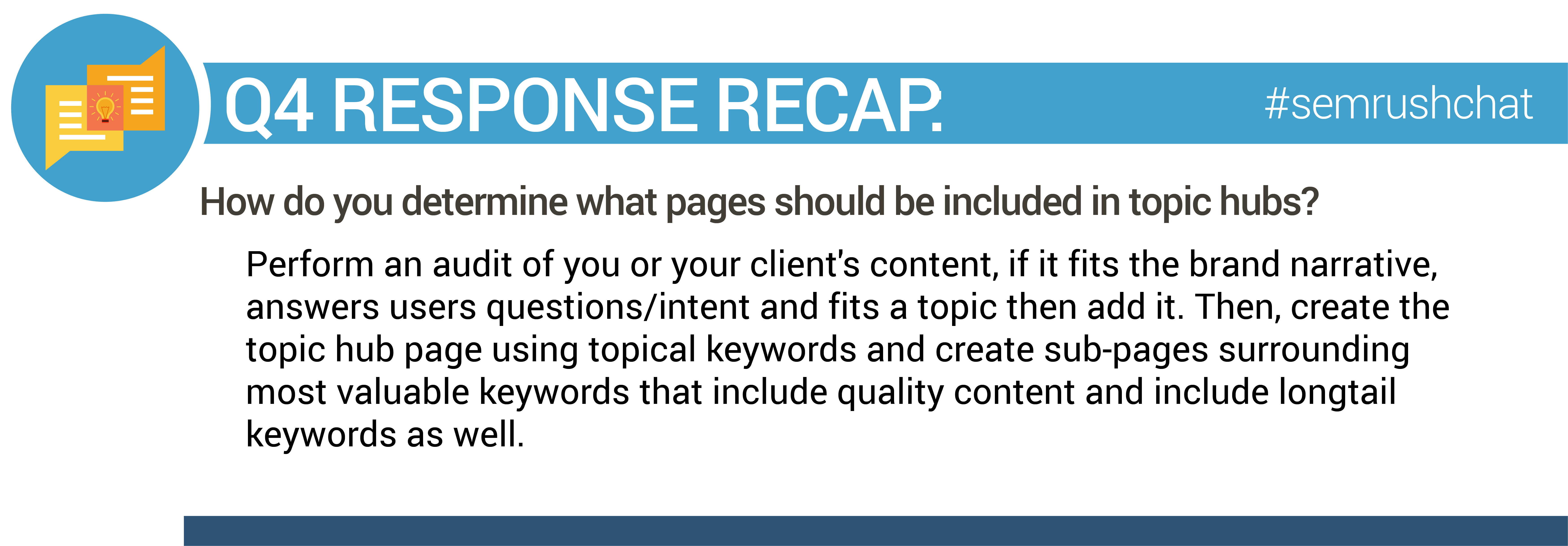
Q5. What are the key SEO elements to include in creating the content for each page of a topic hub?
As we discussed in our last #SEMrushchat, technical SEO influences to a large extent how Google crawls, indexes and returns content. With frequent updates to the core algorithm that specifically deals with the quality of information on your site (think Hummingbird, RankBrain and the now ubiquitous “core updates”), it is clear that content, meta content, as well as HTML code, are crucial in keeping the on-site SEO running.
The SEMrush Content Template tool analyzes the top ranking pages in Google’s search results for the keywords you want to target and helps you create SEO-friendly content on the topic with correlated recommendations on semantically related terms, page titles, the ideal content length, and so on.
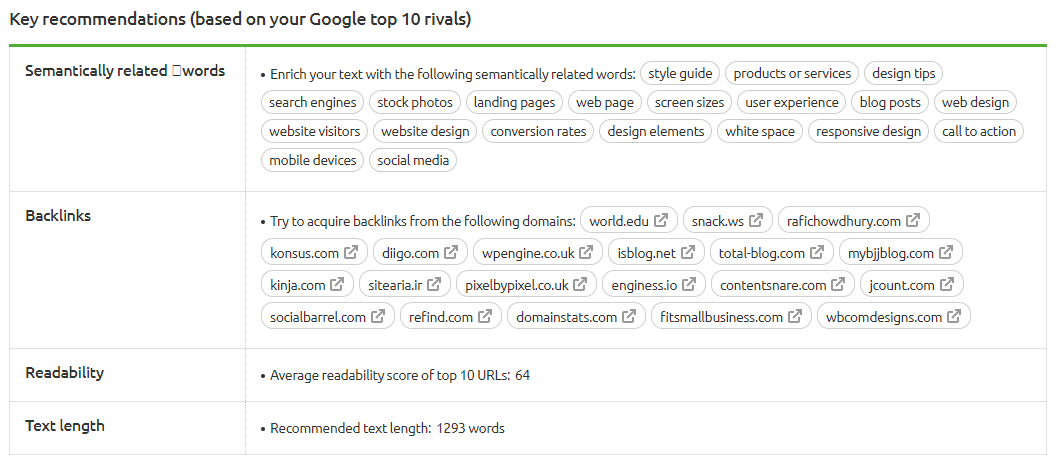
The key SEO element is your content itself if you ask Dan. You can wax eloquent on the structure, length, design, headings, and so on, but at the end of the day, it has to be “great content.”
A5.2 - This means concretely, all the things we know about "great content" - clear/helpful headings, well-researched, shows trust, serves the user, great page design/UX - yada yada yada #seinfeld #semrushchat
— Dan Shure (@dan_shure) September 19, 2018
Make sure you have the basic HTML tags in place.
A5) Write naturally with the communications objective of the page in mind. Keep on topic and use your Hemingway worshipping brain.
Fill in all tags and meta description etc. I still use h1s and h2s etc
Make links to other content within the hub. #semrushchat
— David Rosam (@davidrosam) September 19, 2018
A5: The collated content is presented as a page on it own right, With #TopicHub page name, title, description, h1 , h2, images, cta's, alternative or similar #TopicHubs in ux #SEO @dan_shure @semrush #SEMrushchat https://t.co/Y8vcb7ekey
— Alexis Huddart (@Flexoid) September 19, 2018
A5 Page Title and Meta Description; main heading and subheadings; descriptive content and meaningful images with associated text. Anchors pointed to related pages that it is a hub for. #SEMRUSHChat
— Bill Slawski ⚓ (@bill_slawski) September 19, 2018
A5: A clear featured image, an H1, an enticing title tag & meta description, well-organized articles ... make sure key SEO info is set on the back-end and create an attractive user experience on the front that will keep users around to, say, sign up for a newsletter. #SEMRushChat
— Marccx Media (@marccxmedia) September 19, 2018
A5
1) Enticing page title and description with KW 2) H1, H2, imagery, bullet points, internal links with KW 3) Ensure fast page loading time 4) It Depends #semrushchat
— SEO Consultant (@JLFaverio) September 19, 2018
The right internal linking strategy with appropriate anchor text will serve you well.
A5: A key element of creating topic hubs is internal linking! When new pages/sub-hubs are created, it's often overlooked to go back and get them all linked up together. I also make links from the main hub to sub hubs no-follow. #SEMrushchat
— Danny Conlon (@MissDannySEO) September 19, 2018
a5. Focus-keyword-rich introductory content (above the fold), thumbnal abstract for topic sections on page, keyword-rich anchor link text that has strong information scent for destination, fully optimized HTML title and meta descriptions, optimized h2 headings. #semrushchat
— Marianne Sweeny (@msweeny) September 19, 2018
Finally, create content based on in-depth research.
Make sure it answers any and all questions your customers might have.
A5: Perform research beforehand on topics. What is already out there? How is it formatted? What’s ranking first? And how can I create something better? #semrushchat
— CallRail (@CallRail) September 19, 2018
A5: FAQs + "See Also" + Inverted pyramid ... a magic formula for building these in a client-friendly way. FAQs = most underrated topic hub mechanism on earth. When done, usually FAQs answers are too short, skip "see alsos" #semrushchat
— Scott Clark (@scottclark) September 19, 2018
A5/2: Remember to create pages that answer the users' intent. Talk about the subject and make good use of headings / sub-headings and bucket brigades if you can #semrushchat
— Andy Drinkwater (@iqseo) September 19, 2018
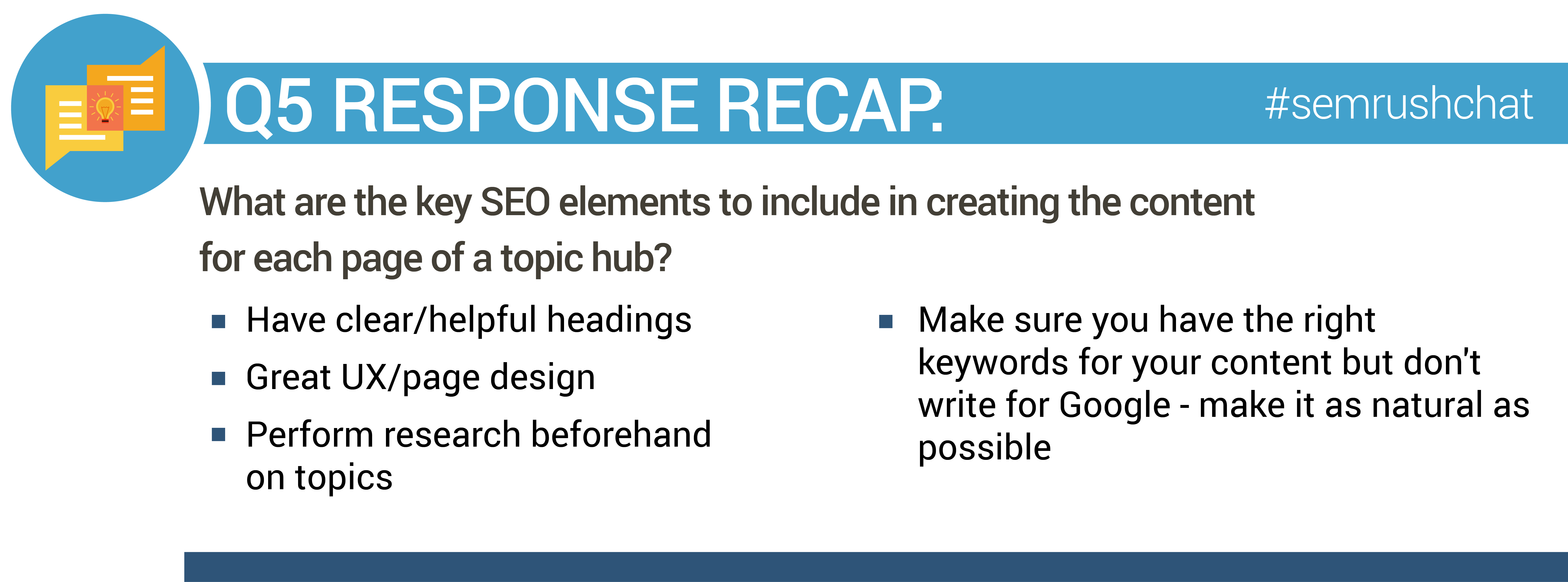 If you made it this far, you probably noticed our new format for these posts, with to-the-point advice and more original insights – do let us know if you like it! If you have any ideas on how to create topic hubs and cluster your site content more effectively for better rankings and conversions, we are all ears in the comments!
If you made it this far, you probably noticed our new format for these posts, with to-the-point advice and more original insights – do let us know if you like it! If you have any ideas on how to create topic hubs and cluster your site content more effectively for better rankings and conversions, we are all ears in the comments!
Dan Shure's Key Takeaways:
Carefully review your site's content be sure you don't cannibalize keywords when creating your topic hub. Use metrics like search volume and keyword difficulty to help prioritize. Search engines still care about keywords - topics are just a good way to organize related keywords on your site.We’d also love to have you on this Wednesday’s #SEMrushchat at 11 AM ET/3 PM GMT, where Jen Cole will be sharing tips and tricks on "Community Building: How To Win Fans And Influence Users."
Innovative SEO services
SEO is a patience game; no secret there. We`ll work with you to develop a Search strategy focused on producing increased traffic rankings in as early as 3-months.
A proven Allinclusive. SEO services for measuring, executing, and optimizing for Search Engine success. We say what we do and do what we say.
Our company as Semrush Agency Partner has designed a search engine optimization service that is both ethical and result-driven. We use the latest tools, strategies, and trends to help you move up in the search engines for the right keywords to get noticed by the right audience.
Today, you can schedule a Discovery call with us about your company needs.
Source:





